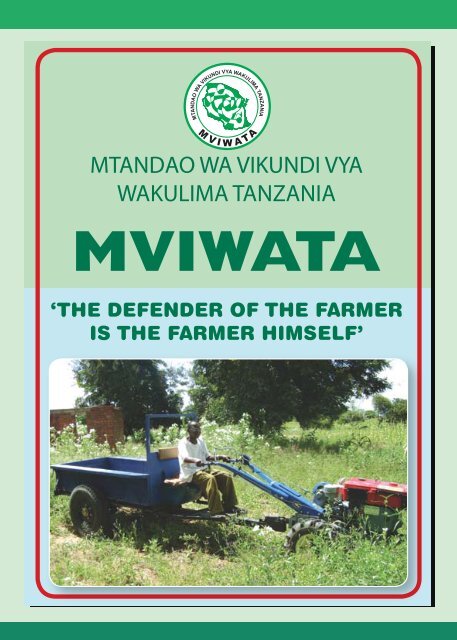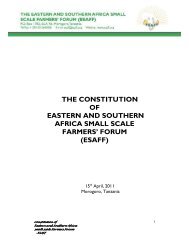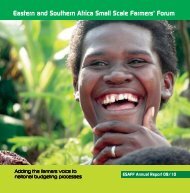MVIWATA
MVIWATA text- English.pdf
MVIWATA text- English.pdf
- No tags were found...
You also want an ePaper? Increase the reach of your titles
YUMPU automatically turns print PDFs into web optimized ePapers that Google loves.
MTANDAO WA VIKUNDI VYA WAKULIMA TANZANIA<br />
M V<br />
I W A T A<br />
Mtandao wa Vikundi vya<br />
Wakulima Tanzania<br />
<strong>MVIWATA</strong><br />
‘The defender of the farmer<br />
is the farmer himself’<br />
________________________<br />
1. Vituo hivi ni asasi ambazo zimekuza ustadi bainifu na ufahamivu sana katika maeneo maalum<br />
yahusianayo na vyama vya ushirika.<br />
2. ‘Raghba yetu ya pamoja’: Taarifa ya Tume kwa Afrika, 2005.<br />
3. Ili mradi tu wanatekeleza shughuli za kiuchumi na/au shughuli za kijamii na wanatimiza masharti<br />
yaliyowekwa na ILO, Mapendekezo 193 (cf. http://www.ilo.org/ilolex/cgi-lex/convde.pl?R193)
Introduction<br />
Mtandao wa Vikundi vya Wakulima Tanzania (<strong>MVIWATA</strong>) is a farmers organisation which<br />
unites small holder farmers in order to have a common voice in defence economic, social,<br />
cultural and political interests of smallholder farmers. It is the accronym for the National<br />
Network of Small-Scale Farmers Groups in Tanzania.<br />
<strong>MVIWATA</strong> was founded in 1993, by 22 innovative farmers from Morogoro, Iringa, Kilimanjaro,<br />
Mbeya, Rukwa and Dodoma regions for the purpose of creating a farmer-to-farmer exchange<br />
forum. Sokoine University of Agriculture (SUA) through its Strengthening Communication<br />
Project (SUA-SCOM) guided the initial process in the formation of <strong>MVIWATA</strong>.<br />
It was registered in 1995 under the Society Ordinance Act (Reg. no. SO 8612), in 2000 as the<br />
Trust Fund. In 2007 <strong>MVIWATA</strong> received a compliance certificate under the NGO Act of 2002<br />
(Reg. no 1930). The national office of <strong>MVIWATA</strong> is situated in Morogoro town.<br />
The slogan of <strong>MVIWATA</strong> is Mtetezi wa Mkulima ni Mkulima Mwenyewe literally means<br />
the defender of the farmer is the farmer himself.<br />
Our Goal: To unite small holder farmers (including all small producers whose livelihood<br />
depend on land such as pastoralists and fisher folk) in order to defend their interests and<br />
address the challenges of farmers with one voice.<br />
Our Mission:<br />
To strengthen farmers’ groups and networks, facilitate communication and learning through<br />
exchange visits among farmers for the purpose of defending the interests of small scale<br />
farmers.<br />
Our Vision:<br />
To become a strong farmers’ organisation that will guarantee small-scale farmers’<br />
participation and representation in socio-economic and policy dialogue process at various<br />
levels through learning, initiating, implementing and monitoring social and economic<br />
development processes.<br />
Our Objectives<br />
1. To facilitate communication among small scale farmers in order to build collective<br />
strategies for defending farmers interests<br />
2. To facilitate exchange of knowledge, experiences and ideas on farming and activities<br />
which aim at improving the livelihood of farmers.<br />
3. To represent small holder farmers in matters and decision making bodies of interest to<br />
smallholder farmers.
Our strategies<br />
The main strategies of <strong>MVIWATA</strong> are the following;<br />
1. Capacity building of small-scale farmers on lobbying and advocacy through training<br />
and self organisation in groups and networks under one umbrella so as to influence<br />
decisions<br />
2. Economic empowerment of small scale farmers through creation of projects such as<br />
savings and credit, cereal banks, rural tourism and other rural enterprises.<br />
3. Affiliation with national and international networks and organisations for lobbying and<br />
advocacy purposes.<br />
Key thematic areas<br />
1. Lobbying and advocacy: To build the lobbying and advocacy capacity of small-scale<br />
farmers.<br />
2. Economic empowerment: to enable small scale farmers become economically<br />
empowered through initiatives such as savings and credit, market linkages and<br />
development of entrepreneurship skills<br />
3. Strengthening the farmers’ groups and network for the purpose of self-organising<br />
4. Building knowledge of farmers on cross cutting issues (HIV/AIDS, Gender and<br />
Climate change)<br />
5. Institutional development of <strong>MVIWATA</strong><br />
Organisational Structure<br />
The structure of <strong>MVIWATA</strong> provides for four categories:<br />
• Annual General Meeting (AGM)<br />
• The Council which comprises of the representatives from middle levels and members
of board of directors<br />
• Board of Directors is constituted by 9 elected members who are elected every three<br />
years by the Annual General Meeting (AGM).<br />
• Management (Secretariate) headed by the Executive Director.<br />
The Middle Level Networks (intermediary levels is composed of farmers’ networks at<br />
regional and district level, while the Grass root level are networks of farmers groups and<br />
local producers at village and ward level.<br />
Currently there are 15 middle level networks in 12 regions and 2 districts in Chunya, Dodoma.<br />
Iringa, Kagera, Kilimanjaro, Manyara, Mbeya, Monduli, Morogoro, Rukwa Ruvuma, Shinyanga,<br />
Tabora, Tanga and Zanzibar.<br />
Activities<br />
1. Facilitating organization of small-scale farmers into groups, local and middle networks<br />
to form a sound and strong national farmers’ organ.<br />
2. Lobbying and advocacy for issues of interests to the small scale farmers and ensure<br />
representation of farmers’ views in the policies that affect them.<br />
3. Capacity building of small-scale farmers on leadership, economic skills such as<br />
marketing, savings and credits and income generating activities and on cross cutting<br />
issues such as HIV/AIDS and Gender.<br />
4. Collecting and disseminating of information on experiences and knowledge of farmers<br />
through publications such as Pambazuko quarterly Newsletter ‘The Voice of Farmers’,<br />
weekly radio program ‘Voice of <strong>MVIWATA</strong> and other publications.<br />
5. Develop participatory economic projects for the purpose of economically empowering<br />
farmers<br />
6. Organising farmers’ dialogue and forums such workshops and meetings, study tours,<br />
exchange visits and facilitation of farmers to participation in agricultural shows to<br />
market their products and enhance learning.
Programs and Projects<br />
Some of the main programs that have been implemented by <strong>MVIWATA</strong> include the<br />
following;<br />
1. Rural Markets Development Project (RMDP), which was implemented from January<br />
2002 to December, 2004. RMDP was financed by the French Government through its<br />
international development arm AFD. Through the implementation of RMDP four rural<br />
markets were been constructed, which are Kibaigwa market in Kongwa district Dodoma,<br />
Tandai and Tawa markets in Morogoro district and Nyandira market in Mvomero district<br />
Morogoro.<br />
2. Support to Rural Markets (SRM). The three years project been implemented between<br />
April 2006 March 2009, through a partnership between <strong>MVIWATA</strong> and FERT, financed<br />
mainly by the European Union (EU).<br />
3. Improvement of Financial services to farmers by establishing micro finance institutions.<br />
<strong>MVIWATA</strong> is being implementing the project in partnership with LVIA, FERT and UMADEP<br />
in Morogoro, Dodoma and Kilimanjaro regions, financed by European Union (EU).<br />
4. Empowering participation of the farmers in planning and monitoring in agricultural<br />
sector being implemented through a partnership with IFAD.<br />
5. Projects for enhancing agricultural and livestock production and local economy in<br />
partnership with TRIAS and SCC.<br />
6. Promotion of Rural Tourism, the project being implemented in partnership with<br />
Agriterra.<br />
7. Strengthening the farmers’ groups and networks at all levels, the project being<br />
implemented in partnership with Agriterra, OXFAM and VECO.<br />
Membership<br />
<strong>MVIWATA</strong> has three types of membership<br />
Ordinary members, which fall into two categories;<br />
a) groups<br />
b) individual farmer whose membership is acquired through the group. The farmer<br />
becomes a member of <strong>MVIWATA</strong> automatically after his/her group/network has been<br />
registered as a member.<br />
Organisations, associations and networks which are owned by small-scale farmers<br />
and whose objectives are compliant with the mission of <strong>MVIWATA</strong> can be eligible for<br />
membership.<br />
Associate member is any person, institution or a group of people, who cannot become<br />
ordinary members but whose contribution can be outstanding and can enhance the mission<br />
of <strong>MVIWATA</strong>.
Currently <strong>MVIWATA</strong> it has about 70, 000 individual small-scale farmers through their<br />
groups.<br />
Collaboration and Partnership<br />
<strong>MVIWATA</strong> has collaboration or partnerships with the following institutions;<br />
• The Government of Tanzania<br />
• The Government of Zanzibar<br />
• Sokoine University of Agriculture (SUA)<br />
• Moshi University College of Cooperative and Business Studies (MUCCOBs)<br />
Non-governmental organizations, local and international such as;<br />
• Agriterra of Netherlands<br />
• FERT of France<br />
• GRET of France<br />
• INADES Formation Tanzania<br />
• International Fund for Agricultural Development (IFAD)<br />
• KEPA of Finland<br />
• Lay Volunteers International Association (LVIA) of Italy.<br />
• OXFAM Ireland and OXFAM International<br />
• Participatory Ecological and Land use Management (PELUM)<br />
• Swedish Cooperative Centre (SCC) of Sweden<br />
• TRIAS of Belgium<br />
• VECO of Belgium
Achievements<br />
1. Empowerment of Small- scale farmers’ networks in regional, district, ward and village<br />
level.<br />
2. Improved credit access and living standard of small-scale farmers with rural micro<br />
finance institutions, processing, marketing and entrepreneurship. A total of six markets<br />
under farmers’ supervision have been constructed in Morogoro, Dodoma, Tanga and<br />
Iringa regions.<br />
3. Improved food security situation of farmers as the success of cereal banks, processing<br />
and storage modernized techniques.<br />
4. Recognition of farmers who in some areas have been involved in decision making<br />
organs such as Regional Advisory Board and ward development committee, as the sign<br />
of recognition of <strong>MVIWATA</strong>.<br />
5. Improved knowledge, skills and self-esteem of Small-scale farmers as the success of<br />
training program of <strong>MVIWATA</strong><br />
For further information contact<br />
Head Office <strong>MVIWATA</strong><br />
The Executive Director<br />
<strong>MVIWATA</strong><br />
P.O. Box 3220 Morogoro<br />
Tel: 023 261 41 84<br />
Fax: 023 261 41 84<br />
Email: mviwata@morogoro.net<br />
Middle Level Office<br />
Coordinator<br />
<strong>MVIWATA</strong> Morogoro<br />
P.O. Box 3220 Morogoro<br />
Location: Nane Nane ground, Opp. TASO<br />
Mob: +255 786 393 405,<br />
Fax: +255 23 261 41 84<br />
Email: efratema@yahoo.com<br />
Coordinator<br />
<strong>MVIWATA</strong> Rukwa<br />
P.O.Box 468 Sumbawanga<br />
Location: MAENDELEO BUILDING -<br />
KATANDALA<br />
Mob: +255 787 770 745<br />
Fax: +255 25 280 25 58<br />
Email: anthonymhagama@yahoo.com<br />
Coordinator<br />
<strong>MVIWATA</strong> Mbeya<br />
P.O.Box 3015 Mbeya<br />
Location: NIC and CRDB bank Building<br />
Tel/Fax: +255 25 250 30 62,<br />
Email: mviwatambeya@yahoo.co.uk<br />
Coordinator<br />
<strong>MVIWATA</strong> Chunya<br />
Location: Chunya District Council<br />
compound, Room No.3<br />
Mob: +255 787 269 923<br />
Email: lufunyo1974@yahoo.co.uk<br />
Coordinator<br />
<strong>MVIWATA</strong> Iringa<br />
P.O.Box 918 Njombe<br />
Location: Njoroma Building, Njombe<br />
Mob: +255 782 241 224<br />
Email: mviwatairinga@yahoo.com
Coordinator<br />
<strong>MVIWATA</strong> Kilimanjaro<br />
P.O.Box 7389 Moshi<br />
Location: Mbuyuni market- GOLDEN<br />
GROWN LODGE floor<br />
Tel: +255 27 275 16 39, +255 755 474 088<br />
Email: mviwatakilimanjaro2006@yahoo.com<br />
Email: kaukirms@yahoo.com<br />
Coordinator<br />
<strong>MVIWATA</strong> Kagera<br />
P.O.Box 713 Kagera<br />
Location: Zamzam street Bukoba<br />
Tel/Fax:: +255 28 222 00 46<br />
Email: mviwatakgr@yahoo.com<br />
Coordinator<br />
<strong>MVIWATA</strong> Dodoma<br />
P.O.Box 3293 Dodoma<br />
Location:Area C Dodoma, INADES<br />
Formation Tz building,opp Area C mosque<br />
Tel: +255 26 235 00 13,<br />
Fax: +255 26 235 07 44,<br />
Mob: +255 755 074 755<br />
Email: mviwatadodoma@yahoo.com /<br />
sanga.daines@yahoo.com<br />
Coordinator<br />
<strong>MVIWATA</strong> Monduli (MVIWAMO)<br />
P.O.Box 47 Monduli<br />
Location: Boma road-Moringe Secondary<br />
School, Monduli<br />
Tel: +255 27 253 80 29, +255 27 253 83 37<br />
Fax: +255 27 253 83 38<br />
Email: mviwata-monduli@satconet.net,<br />
ricmasandika@yahoo.com<br />
Coordinator<br />
<strong>MVIWATA</strong> Zanzibar<br />
P.O.Box 149 Zanzibar<br />
Location: Mwana kwereke- opp. M’kwereke<br />
A secondary school<br />
Mob: +255 777 496 700, +255 713 432 989<br />
Email:aksalum@yahoo.com<br />
Coordinator<br />
<strong>MVIWATA</strong> Ruvuma<br />
P.O.Box 696 Songea Manicipality<br />
Location: TTCL building 2nd floor<br />
Tel: +255-25-260 06 26,<br />
Mob: +255 756 096 291<br />
Email: mviwataruv70@yahoo.com<br />
Coordinator<br />
<strong>MVIWATA</strong> Mkuranga<br />
P.O.Box 56 Mkuranga<br />
Location: Opp Highway Guest House<br />
Tel: +255 786 158 646<br />
Email: kihwele1982@yahoo.co.uk<br />
Chairperson<br />
<strong>MVIWATA</strong> Kigoma<br />
P.O.Box 1144 Kigoma<br />
Location: KIKANGONET office, Lumumba<br />
road NHC bulding room 205<br />
Mob: +255 713 565 252, +255 762 565 252<br />
Email: aisimba@yahoo.co.uk<br />
Chairperson<br />
<strong>MVIWATA</strong> Shinyanga<br />
Location: Moshi Co-operative College,<br />
Shinyanga Branch (Kizumbi)<br />
Mob: +255 763 74 0 675<br />
Fax: +255 28 2762609





